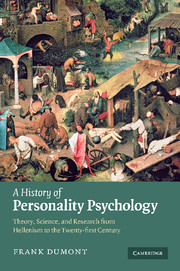 A History of Personality Psychology
A History of Personality Psychology Book contents
- Frontmatter
- Contents
- List of tables and figures
- Preface
- 1 Historical precursors of personality theory
- 2 From illness to wellness models of human nature
- 3 Developmental perspectives on personality: from youth-based to life-span models
- 4 The biology of personality
- 5 Trait theories and the psychology of individual differences
- 6 The puzzle of the self
- 7 Culture and personality
- 8 Gendered personality
- 9 Emotions and reasoning: a definition of the Human
- 10 Taking the measure of the Human: benefits and inherent limitations of personality measures
- 11 Can personality change? The possibilities of psychotherapeutics
- 12 The disordered personality: evolution of nosological systems
- 13 Eight appendices: at the margins of personality psychology
- References
- Author index
- Subject index
1 - Historical precursors of personality theory
Published online by Cambridge University Press: 03 May 2010
- Frontmatter
- Contents
- List of tables and figures
- Preface
- 1 Historical precursors of personality theory
- 2 From illness to wellness models of human nature
- 3 Developmental perspectives on personality: from youth-based to life-span models
- 4 The biology of personality
- 5 Trait theories and the psychology of individual differences
- 6 The puzzle of the self
- 7 Culture and personality
- 8 Gendered personality
- 9 Emotions and reasoning: a definition of the Human
- 10 Taking the measure of the Human: benefits and inherent limitations of personality measures
- 11 Can personality change? The possibilities of psychotherapeutics
- 12 The disordered personality: evolution of nosological systems
- 13 Eight appendices: at the margins of personality psychology
- References
- Author index
- Subject index
Summary
[A person is] a flow of powerful subjective life, conscious and unconscious; a whispering gallery in which voices echo from the distant past; a gulf stream of fantasies with floating memories of past events, currents of contending complexes, plots and counterplots, hopeful intimations and ideals … A personality is a full Congress of orators and pressure groups, of children, demagogues, communists, isolationists, war-mongers, mugwumps, grafters, log rollers, lobbyists, Caesars and Christs, Machiavellis and Judases, Tories and Promethean revolutionists.
Henry Murray, 1940, pp. 160–61A characteristic of contemporary times is that many students – and more than a few scholars – think that the core principles of psychology were developed and validated in the twentieth century, indeed, in their lifetime. Students are often reluctant to read journal articles that are more than a few years old. But this is not just characteristic of the young. In his masterful history of dynamic psychiatry, Henri Ellenberger (1970) wrote that great system builders and theoreticians like Jean-Martin Charcot and Sigmund Freud also suffered from a surprising ahistoricism. He stated, “these men shared an illusion, which has by no means disappeared today, that everything they brought forth was new” (p. 750). This bias can obscure students' views of the wellsprings of modern psychology and cause them to spurn the work of those scholars who laid the foundations of their disciplines.
- Type
- Chapter
- Information
- A History of Personality PsychologyTheory, Science, and Research from Hellenism to the Twenty-First Century, pp. 1 - 34Publisher: Cambridge University PressPrint publication year: 2010


